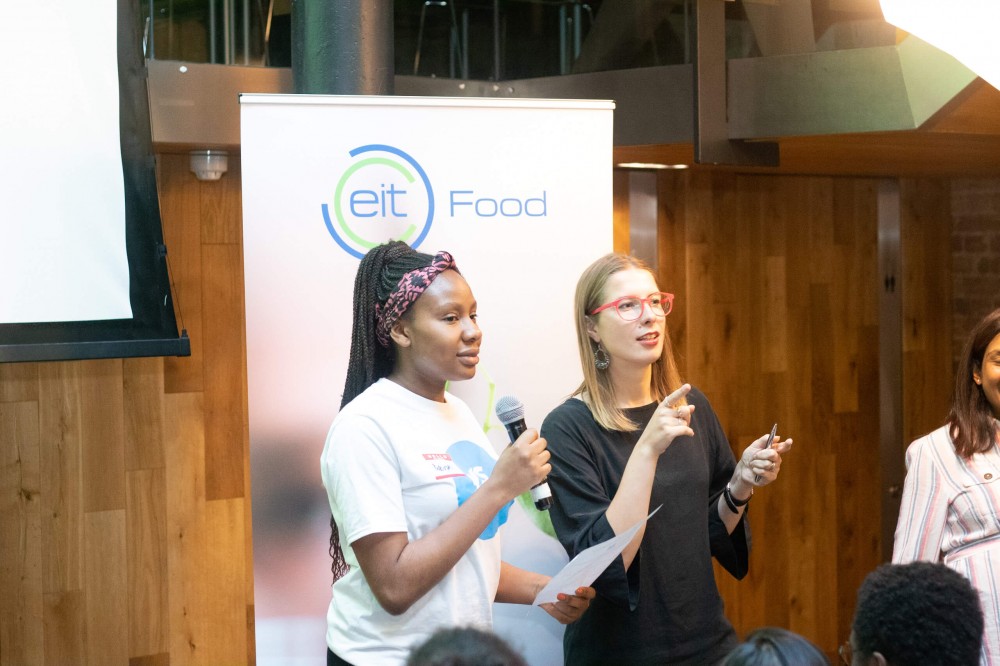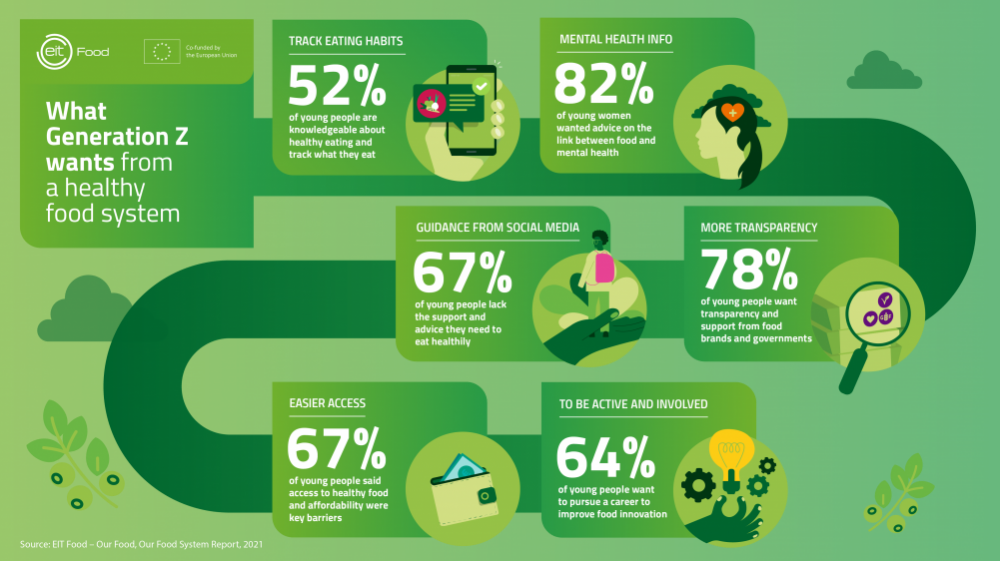Health, nutrition and Gen Z: what do young people want from the food system?
Young people are instrumental in shaping the future of food and deserve a voice. Here we explore the key findings of the recent EIT Food report about Gen Z, 'Our Food, Our Food System', which seeks to understand what young people want, need and expect from the food system.

We are entering a crucial period in our race to meet the Read the ‘Our Food, Our Food System’ report in full, and the food system is under pressure to make changes fit for the future. With 2021 marking the first ever Read the ‘Our Food, Our Food System’ report in full, the need for change has never been clearer, from health and nutrition to sustainability and resiliency.
In order to design the food system of tomorrow, we must grow and adapt with a clear understanding of what needs to change today. To do this, we need to work together with those who will be most affected by the long term impacts of these decisions.
What is Generation Z?
Generation Z or 'Gen Z', includes young people born after 1995/1996. In the EU, they are considered the most diverse generation when it comes to culture and heritage as well as the best educated in terms of level of education (1). However, they are also the most vulnerable.
With half of all mental health challenges in adulthood starting during or before adolescence (2), combined with financial and social pressures, young people are faced with a complex mix of challenges. They are considered the generation most at risk of poverty (1) and vulnerable to food insecurity (3) as a result. They have also been hardest hit by the coronavirus crisis (1) due to school closures, job losses and reduced social contact.
With approximately another 15 years before Gen Z forms the majority of the voting age population, along with the 'Millennials' (born between 1981 and 1995/1996) (1), it is important for their voice to be heard in other ways. In order to better understand young people’s views and expectations from the food system, we commissioned research that surveyed over 2,000 people aged 18-24 from the UK, France, Germany, Poland and Spain, and have summarised the key findings below.
Read the ‘Our Food, Our Food System’ report in full
What does Gen Z want from the food system?
Gen Z are generally knowledgeable and entrepreneurial when it comes to their eating habits, but the survey revealed that young people do not feel their needs are being adequately met. Healthy eating, for example, was highlighted as important but often out of reach due to cost and busy lifestyles.

The top 4 things Gen Z want from the food system:
1. To be part of the solution
Although 18-24 year olds are taking action on healthy eating, they want to become active changemakers and part of the solution.
Over half of survey respondents (58%) referenced the COVID-19 pandemic as increasing their awareness of the importance of healthy eating.
This was also reflected in our 2020 COVID-19 study with Aarhus University, where almost half of consumers said that they felt that being in good health was more important to them as a result of the pandemic (4). At the time, Professor Klaus Grunert, Head of Section of the Department of Management at Aarhus University, the COVID-19 study lead (4), commented that this awareness presents the industry with a “real opportunity to innovate to meet consumer needs,” adding that consumers must become active changemakers in shaping the future of food.
Promisingly, 66% of young people stated they would consider taking a job in food education and 64% in food innovation. This highlights how the increased interest in healthy eating is potentially leading young people to pursue roles as active changemakers, as pointed out by Professor Klaus.
Whether it be a trend or a true desire to eat healthier food, young people are frequently taking matters into their own hands. In the Gen Z study, over half said they track their food in some way, with 36% of this focused on counting calories and 24% on macronutrients. This suggests that labelling plays an important role for young people when it comes to healthy eating.
2. Better labelling and education
Nearly eight in 10 young people would like food labels to have clearer information on the way food is processed, while 75% think food brands need to be more transparent. However, over half think that including calorie counts on food labels and menus can be detrimental to people’s mental health, revealing a layered challenge on how best to communicate health and nutrition information.
‘Better labelling’ was also identified as important for building consumer trust in the EIT Food Trust Report 2020, which is one of the key pillars of successfully transforming the food system. The report found a large majority of consumers have concerns about confusing and misleading health claims on labels (5) and would value improved labelling systems.
Find out more about the role of labelling in healthy eating
This goes further than just labelling, however, with a general demand for clearer advice and information in education as well as official advice. 75% of young people, for example, said they need clearer advice on how to eat a healthy, balanced diet, with many reporting they didn’t get enough education on how to eat healthily while at school.
3. Advice on the link between diet and mental health
This also extends to how nutrition can impact other aspects of life such as mental health and wellbeing. Nearly eight in 10 said young people need better advice on the link between what they eat and how this can impact their mental health. This is even more important as we continue to live with COVID-19, which is predicted to have caused elevated rates of stress and anxiety as well as loneliness, depression and substance misuse across Europe and the world (6).
Our 2021 trends blog highlighted a similar demand, where Edward Bergen of research body Mintel predicted an increased drive in the future for modified and tailored diets to improve brain health, states of mind and moods (7).
4. Clearer advice and information
This lack of information – or lack of knowledge about where to find information – means young people are often forced to fill this advice gap themselves. Two-thirds (67%) reported they turn to social media for information, regularly looking at content on platforms such as TikTok or Instagram for healthy food and healthy recipe ideas.
However, this also comes with its own challenges as two thirds (61%) say it can be hard to know how to eat healthily due to so much conflicting advice. In fact, it is estimated that over two-thirds of Europeans encounter ‘fake news’ or disinformation at least once a week (8).
Our Food, Our Food System
We all have a part to play in transforming the food system. Whether it be by increasing our awareness of food challenges through platforms such as FoodUnfolded, or helping to scale game-changing agrifood innovation, all food system players must share responsibility.
With the above findings representing a clear need for action, EIT Food has launched a new campaign, ‘Our Food, Our Food System’, to help young people have their say on the future of food. The campaign has recruited 10 young ‘FutureFoodMakers’ to spearhead a call for radical change in the food sector, tackling access to healthy, sustainable and affordable food.
You can support the campaign on social media by using the #FutureFoodMakers hashtag and tagging EIT Food.
References
- European Parliamentary Research Service: Next generation or lost generation? Children, young people and the pandemic
- WHO Regional Office for Europe: Adolescent mental health in the European region
- FAO: The state of food security and nutrition in the world 2021
- EIT Food: EIT Food report reveals lasting impact of COVID-19 pandemic on European food behaviours
- EIT Food: EIT Food Trust Report 2020
- WHO Regional Office for Europe: Mental health and COVID-19
- EIT Food: The top 5 trends for the agrifood industry in 2021
- Statista: Fake news in Europe - Statistics & Facts
More blog posts

From Pitch to Plate: How Football Is Addressing Food Waste

